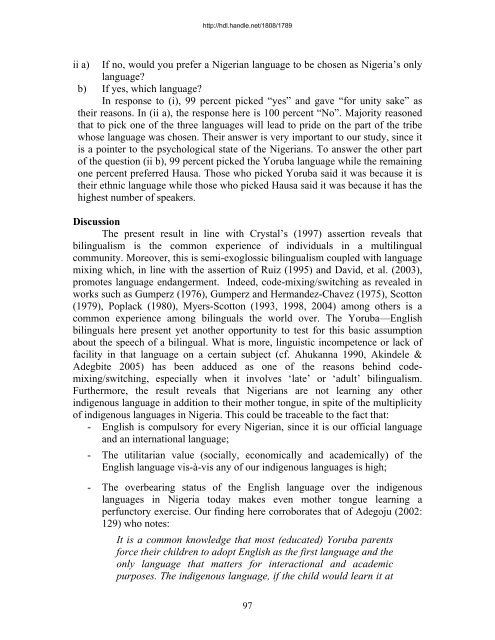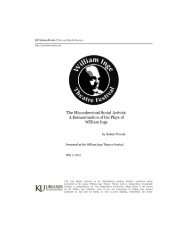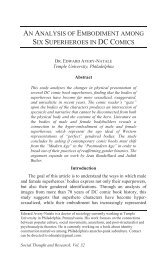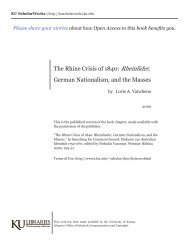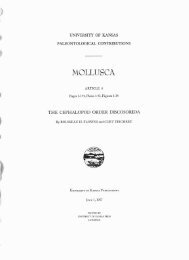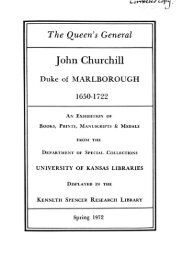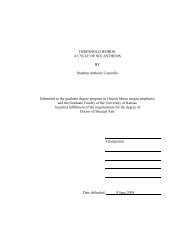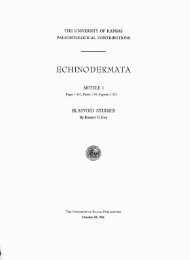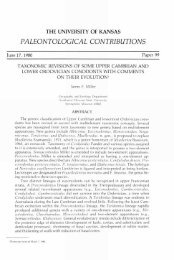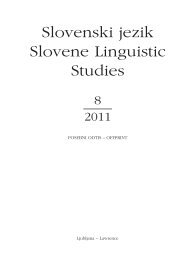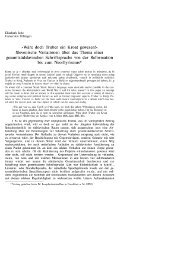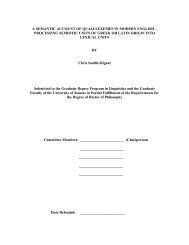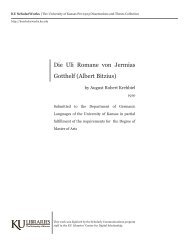LANGUAGE CONTACT AND LANGUAGE ... - KU ScholarWorks
LANGUAGE CONTACT AND LANGUAGE ... - KU ScholarWorks
LANGUAGE CONTACT AND LANGUAGE ... - KU ScholarWorks
Create successful ePaper yourself
Turn your PDF publications into a flip-book with our unique Google optimized e-Paper software.
http://hdl.handle.net/1808/1789<br />
ii a) If no, would you prefer a Nigerian language to be chosen as Nigeria’s only<br />
language?<br />
b) If yes, which language?<br />
In response to (i), 99 percent picked “yes” and gave “for unity sake” as<br />
their reasons. In (ii a), the response here is 100 percent “No”. Majority reasoned<br />
that to pick one of the three languages will lead to pride on the part of the tribe<br />
whose language was chosen. Their answer is very important to our study, since it<br />
is a pointer to the psychological state of the Nigerians. To answer the other part<br />
of the question (ii b), 99 percent picked the Yoruba language while the remaining<br />
one percent preferred Hausa. Those who picked Yoruba said it was because it is<br />
their ethnic language while those who picked Hausa said it was because it has the<br />
highest number of speakers.<br />
Discussion<br />
The present result in line with Crystal’s (1997) assertion reveals that<br />
bilingualism is the common experience of individuals in a multilingual<br />
community. Moreover, this is semi-exoglossic bilingualism coupled with language<br />
mixing which, in line with the assertion of Ruiz (1995) and David, et al. (2003),<br />
promotes language endangerment. Indeed, code-mixing/switching as revealed in<br />
works such as Gumperz (1976), Gumperz and Hermandez-Chavez (1975), Scotton<br />
(1979), Poplack (1980), Myers-Scotton (1993, 1998, 2004) among others is a<br />
common experience among bilinguals the world over. The Yoruba—English<br />
bilinguals here present yet another opportunity to test for this basic assumption<br />
about the speech of a bilingual. What is more, linguistic incompetence or lack of<br />
facility in that language on a certain subject (cf. Ahukanna 1990, Akindele &<br />
Adegbite 2005) has been adduced as one of the reasons behind codemixing/switching,<br />
especially when it involves ‘late’ or ‘adult’ bilingualism.<br />
Furthermore, the result reveals that Nigerians are not learning any other<br />
indigenous language in addition to their mother tongue, in spite of the multiplicity<br />
of indigenous languages in Nigeria. This could be traceable to the fact that:<br />
- English is compulsory for every Nigerian, since it is our official language<br />
and an international language;<br />
- The utilitarian value (socially, economically and academically) of the<br />
English language vis-à-vis any of our indigenous languages is high;<br />
- The overbearing status of the English language over the indigenous<br />
languages in Nigeria today makes even mother tongue learning a<br />
perfunctory exercise. Our finding here corroborates that of Adegoju (2002:<br />
129) who notes:<br />
It is a common knowledge that most (educated) Yoruba parents<br />
force their children to adopt English as the first language and the<br />
only language that matters for interactional and academic<br />
purposes. The indigenous language, if the child would learn it at<br />
97


